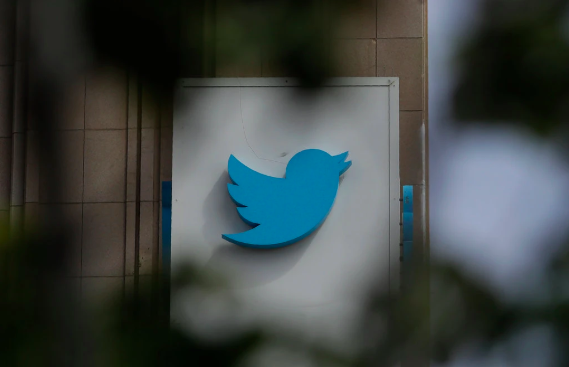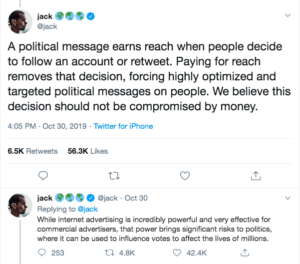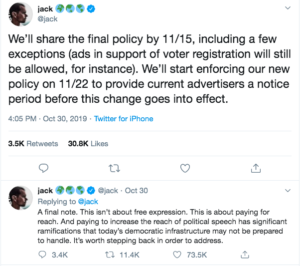Insights
Free Speech vs. Paid Speech: How Twitter and Facebook Differ in Their Approach on Political Advertising.

We are one year away from the presidential election and tensions around political advertising on social media platforms are at a historic level. Last week, Jack Dorsey, founder and CEO of Twitter, announced they will be banning all political ads on its platform, beginning November 22, 2019. The move comes on the heels of fellow social media giant Facebook taking an opposing position.
Twitter’s timing of their announcement was seen by some as a PR ploy, or as millennials would say— subtweeting Mark Zuckerberg— since it was released right before Facebook’s Q3 earnings release.
Dorsey posted the following thread of tweets, explaining his decision.

 At the heart of Dorsey’s message is the notion that free speech is not the same as paid speech, which is what he thinks Zuckerberg fails to understand. Currently, the Federal Communications Commission does not regulate Facebook and Twitter political content in the same way as traditional media outlets.
By banning political ads, Twitter is establishing itself as the arbiter of what counts as “political” and this will lead to heavy backlash from groups that disagree with a private company determining what content it allows.
Twitter’s decision marks the most recent headline to raise the question of how social media platforms handle political advertising.
Comparing Twitter’s approach with Facebook’s is revealing, and should serve as a warning to organizations wishing to push political ads in the future. As social media platforms continue to blur the line between being a platform and being a publisher, this debate will impact organizations’ abilities to amplify their messages via issues/advocacy ads.
Facebook insists that it is a platform and not a publisher, and because it is a platform, it should not be involved in censoring its users. In reality, however, Facebook is quietly making the transition from a platform, where open and free discourse is the standard, to a publisher, which actively patrols content on its website.
Just this week, Facebook introduced Facebook News, a curated news platform curated by journalists for users, another move that suggests Facebook is taking a more active role in deciding what content it publishes.
Traditional news outlets have regulations regarding political ads. As platforms like Twitter and Facebook increasingly decide what can and cannot exist on their platforms — and become more synonymous with traditional news — regulation of these companies will likely be coming down the pipeline.
Organizations should be aware of the various guidelines and standards for political ads moving forward, as well as issues/advocacy ads, as these companies increasingly impose their own unique guidelines on them. In the meantime, while the debate about the regulation of social media companies continues, organizations should be flexible and aware of how political ads are shared and where they can be shared. Change is coming.
At the heart of Dorsey’s message is the notion that free speech is not the same as paid speech, which is what he thinks Zuckerberg fails to understand. Currently, the Federal Communications Commission does not regulate Facebook and Twitter political content in the same way as traditional media outlets.
By banning political ads, Twitter is establishing itself as the arbiter of what counts as “political” and this will lead to heavy backlash from groups that disagree with a private company determining what content it allows.
Twitter’s decision marks the most recent headline to raise the question of how social media platforms handle political advertising.
Comparing Twitter’s approach with Facebook’s is revealing, and should serve as a warning to organizations wishing to push political ads in the future. As social media platforms continue to blur the line between being a platform and being a publisher, this debate will impact organizations’ abilities to amplify their messages via issues/advocacy ads.
Facebook insists that it is a platform and not a publisher, and because it is a platform, it should not be involved in censoring its users. In reality, however, Facebook is quietly making the transition from a platform, where open and free discourse is the standard, to a publisher, which actively patrols content on its website.
Just this week, Facebook introduced Facebook News, a curated news platform curated by journalists for users, another move that suggests Facebook is taking a more active role in deciding what content it publishes.
Traditional news outlets have regulations regarding political ads. As platforms like Twitter and Facebook increasingly decide what can and cannot exist on their platforms — and become more synonymous with traditional news — regulation of these companies will likely be coming down the pipeline.
Organizations should be aware of the various guidelines and standards for political ads moving forward, as well as issues/advocacy ads, as these companies increasingly impose their own unique guidelines on them. In the meantime, while the debate about the regulation of social media companies continues, organizations should be flexible and aware of how political ads are shared and where they can be shared. Change is coming.

 At the heart of Dorsey’s message is the notion that free speech is not the same as paid speech, which is what he thinks Zuckerberg fails to understand. Currently, the Federal Communications Commission does not regulate Facebook and Twitter political content in the same way as traditional media outlets.
By banning political ads, Twitter is establishing itself as the arbiter of what counts as “political” and this will lead to heavy backlash from groups that disagree with a private company determining what content it allows.
Twitter’s decision marks the most recent headline to raise the question of how social media platforms handle political advertising.
Comparing Twitter’s approach with Facebook’s is revealing, and should serve as a warning to organizations wishing to push political ads in the future. As social media platforms continue to blur the line between being a platform and being a publisher, this debate will impact organizations’ abilities to amplify their messages via issues/advocacy ads.
Facebook insists that it is a platform and not a publisher, and because it is a platform, it should not be involved in censoring its users. In reality, however, Facebook is quietly making the transition from a platform, where open and free discourse is the standard, to a publisher, which actively patrols content on its website.
Just this week, Facebook introduced Facebook News, a curated news platform curated by journalists for users, another move that suggests Facebook is taking a more active role in deciding what content it publishes.
Traditional news outlets have regulations regarding political ads. As platforms like Twitter and Facebook increasingly decide what can and cannot exist on their platforms — and become more synonymous with traditional news — regulation of these companies will likely be coming down the pipeline.
Organizations should be aware of the various guidelines and standards for political ads moving forward, as well as issues/advocacy ads, as these companies increasingly impose their own unique guidelines on them. In the meantime, while the debate about the regulation of social media companies continues, organizations should be flexible and aware of how political ads are shared and where they can be shared. Change is coming.
At the heart of Dorsey’s message is the notion that free speech is not the same as paid speech, which is what he thinks Zuckerberg fails to understand. Currently, the Federal Communications Commission does not regulate Facebook and Twitter political content in the same way as traditional media outlets.
By banning political ads, Twitter is establishing itself as the arbiter of what counts as “political” and this will lead to heavy backlash from groups that disagree with a private company determining what content it allows.
Twitter’s decision marks the most recent headline to raise the question of how social media platforms handle political advertising.
Comparing Twitter’s approach with Facebook’s is revealing, and should serve as a warning to organizations wishing to push political ads in the future. As social media platforms continue to blur the line between being a platform and being a publisher, this debate will impact organizations’ abilities to amplify their messages via issues/advocacy ads.
Facebook insists that it is a platform and not a publisher, and because it is a platform, it should not be involved in censoring its users. In reality, however, Facebook is quietly making the transition from a platform, where open and free discourse is the standard, to a publisher, which actively patrols content on its website.
Just this week, Facebook introduced Facebook News, a curated news platform curated by journalists for users, another move that suggests Facebook is taking a more active role in deciding what content it publishes.
Traditional news outlets have regulations regarding political ads. As platforms like Twitter and Facebook increasingly decide what can and cannot exist on their platforms — and become more synonymous with traditional news — regulation of these companies will likely be coming down the pipeline.
Organizations should be aware of the various guidelines and standards for political ads moving forward, as well as issues/advocacy ads, as these companies increasingly impose their own unique guidelines on them. In the meantime, while the debate about the regulation of social media companies continues, organizations should be flexible and aware of how political ads are shared and where they can be shared. Change is coming.